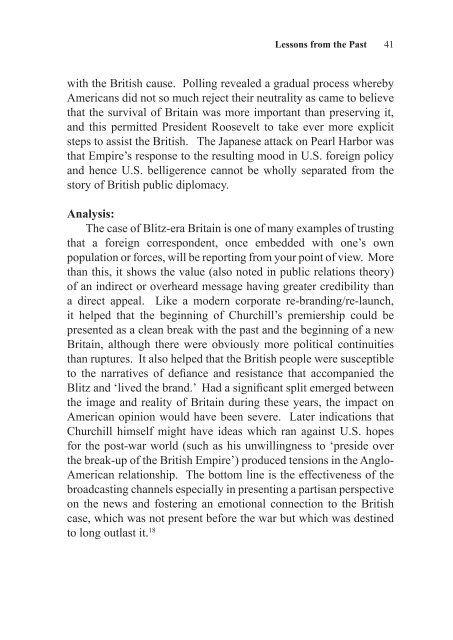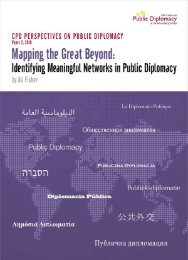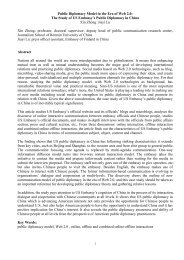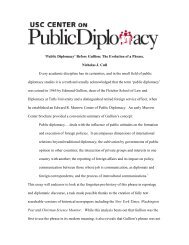Lessons from the Past - USC Center on Public Diplomacy
Lessons from the Past - USC Center on Public Diplomacy
Lessons from the Past - USC Center on Public Diplomacy
You also want an ePaper? Increase the reach of your titles
YUMPU automatically turns print PDFs into web optimized ePapers that Google loves.
<str<strong>on</strong>g>Less<strong>on</strong>s</str<strong>on</strong>g> <str<strong>on</strong>g>from</str<strong>on</strong>g> <str<strong>on</strong>g>the</str<strong>on</strong>g> <str<strong>on</strong>g>Past</str<strong>on</strong>g> 41<br />
with <str<strong>on</strong>g>the</str<strong>on</strong>g> British cause. Polling revealed a gradual process whereby<br />
Americans did not so much reject <str<strong>on</strong>g>the</str<strong>on</strong>g>ir neutrality as came to believe<br />
that <str<strong>on</strong>g>the</str<strong>on</strong>g> survival of Britain was more important than preserving it,<br />
and this permitted President Roosevelt to take ever more explicit<br />
steps to assist <str<strong>on</strong>g>the</str<strong>on</strong>g> British. The Japanese attack <strong>on</strong> Pearl Harbor was<br />
that Empire’s resp<strong>on</strong>se to <str<strong>on</strong>g>the</str<strong>on</strong>g> resulting mood in U.S. foreign policy<br />
and hence U.S. belligerence cannot be wholly separated <str<strong>on</strong>g>from</str<strong>on</strong>g> <str<strong>on</strong>g>the</str<strong>on</strong>g><br />
story of British public diplomacy.<br />
Analysis:<br />
The case of Blitz-era Britain is <strong>on</strong>e of many examples of trusting<br />
that a foreign corresp<strong>on</strong>dent, <strong>on</strong>ce embedded with <strong>on</strong>e’s own<br />
populati<strong>on</strong> or forces, will be reporting <str<strong>on</strong>g>from</str<strong>on</strong>g> your point of view. More<br />
than this, it shows <str<strong>on</strong>g>the</str<strong>on</strong>g> value (also noted in public relati<strong>on</strong>s <str<strong>on</strong>g>the</str<strong>on</strong>g>ory)<br />
of an indirect or overheard message having greater credibility than<br />
a direct appeal. Like a modern corporate re-branding/re-launch,<br />
it helped that <str<strong>on</strong>g>the</str<strong>on</strong>g> beginning of Churchill’s premiership could be<br />
presented as a clean break with <str<strong>on</strong>g>the</str<strong>on</strong>g> past and <str<strong>on</strong>g>the</str<strong>on</strong>g> beginning of a new<br />
Britain, although <str<strong>on</strong>g>the</str<strong>on</strong>g>re were obviously more political c<strong>on</strong>tinuities<br />
than ruptures. It also helped that <str<strong>on</strong>g>the</str<strong>on</strong>g> British people were susceptible<br />
to <str<strong>on</strong>g>the</str<strong>on</strong>g> narratives of defiance and resistance that accompanied <str<strong>on</strong>g>the</str<strong>on</strong>g><br />
Blitz and ‘lived <str<strong>on</strong>g>the</str<strong>on</strong>g> brand.’ Had a significant split emerged between<br />
<str<strong>on</strong>g>the</str<strong>on</strong>g> image and reality of Britain during <str<strong>on</strong>g>the</str<strong>on</strong>g>se years, <str<strong>on</strong>g>the</str<strong>on</strong>g> impact <strong>on</strong><br />
American opini<strong>on</strong> would have been severe. Later indicati<strong>on</strong>s that<br />
Churchill himself might have ideas which ran against U.S. hopes<br />
for <str<strong>on</strong>g>the</str<strong>on</strong>g> post-war world (such as his unwillingness to ‘preside over<br />
<str<strong>on</strong>g>the</str<strong>on</strong>g> break-up of <str<strong>on</strong>g>the</str<strong>on</strong>g> British Empire’) produced tensi<strong>on</strong>s in <str<strong>on</strong>g>the</str<strong>on</strong>g> Anglo-<br />
American relati<strong>on</strong>ship. The bottom line is <str<strong>on</strong>g>the</str<strong>on</strong>g> effectiveness of <str<strong>on</strong>g>the</str<strong>on</strong>g><br />
broadcasting channels especially in presenting a partisan perspective<br />
<strong>on</strong> <str<strong>on</strong>g>the</str<strong>on</strong>g> news and fostering an emoti<strong>on</strong>al c<strong>on</strong>necti<strong>on</strong> to <str<strong>on</strong>g>the</str<strong>on</strong>g> British<br />
case, which was not present before <str<strong>on</strong>g>the</str<strong>on</strong>g> war but which was destined<br />
to l<strong>on</strong>g outlast it. 18











